2008 Poetry Festival
Below is information about the 2008 Festival. You can check out bio's of our Featured Poets, a schedule of the events from the Festival, the group poem--or cento--produced by the featured poets, and a list of partners and sponsors.
You can watch videos and view photos from past festivals on Split This Rock's YouTube and Flickr pages!
Featured Poets
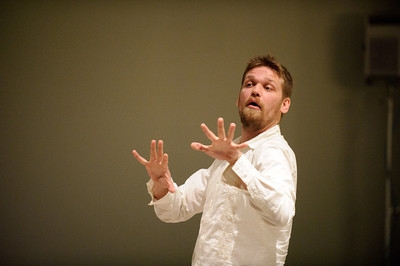 |
Chris August has been a member of four national poetry slam teams, including thetenth place 2005 DC/Baltimore team, and was ranked seventh in the world at the 2005 Individual World Poetry Slam. He is a co-host of Slamicide!, Baltimore’s nationally certified poetry slam, and his performances have been released in audio and video form. He performs widely throughout the country, most recently at the Bowery Poetry Club in New York City. |
 |
Jimmy Santiago Baca, born in New Mexico of Chicano and Apache descent, was sentenced to five years in a maximum security prison at the age of twenty-one; there he learned to read and write and found his passion for poetry. Baca’s many books include The Importance of a Piece of Paper (Grove/Atlantic), Winter Poems Along the Rio Grande (New Directions), A Place to Stand, Healing Earthquakes, Black Mesa Poems, and Immigrants in Our Own Land. He is the winner of the Pushcart Prize, the American Book Award from the Before Columbus Foundation, the National Poetry Award, the International Hispanic Heritage Award, and, for his memoir A Place To Stand, the prestigious International Award. |
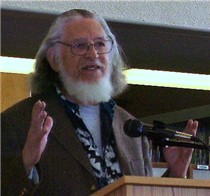 |
Dennis Brutus is a South African poet who was imprisoned on Robben Island with Nelson Mandela and 1,000 others. He is the author of 12 books of poetry, including Poetry and Protest: A Dennis Brutus Reader and Still the Sirens. He is Honorary Professor at the Centre for Civil Society, University of Kwazulu-Natal, in Durban, South Africa and Professor Emeritus at the University of Pittsburgh. Brutus was the recipient of the Langston Hughes Award in 1987 (the first non-African American to receive that award), and the first Paul Robeson Award in 1989 for "artistic excellence, political consciousness and integrity". |
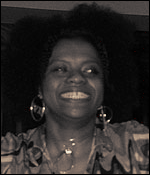 |
Princess of Controversy is an actress, rapper, singer, poet, public speaker and activist. She is an organizer for Critical Resistance, an organization that provides community alternatives to incarceration; a volunteer teacher for the Latin American Youth Center Upward Bound Program and the Young Women’s Drumming Empowerment Project; a member of Blackout Arts Collective, a collective of artists that use art as a mechanism for activism, especially for outreach with youth; and a member of DC Guerilla Poets Insurgency, an informal cultural collective of artists, activists and organizations seeking to expose the political propaganda of today’s society. |
 |
Kenneth Carroll is a native Washingtonian. He is the author of a book of poems, So What! For the White Dude Who Said This Ain't Poetry (The Bunny and the Crocodile Press, 1997). Carroll is Director of DC WritersCorps, an arts and social service program founded by the NEA and AmeriCorps that was honored in 1999 by the national Coming Up Taller Awards. He is the past president of the African American Writers Guild, served on the board of directors of the Poetry Committee of Greater Washington, and was a founding member of the 8Rock Writers Collective. |
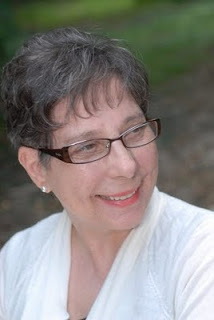 |
Grace Cavalieri is the author of several books, and produced plays. She’s produced “The Poet and the Poem” from the Library of Congress on public radio, ( now in its 31st year.) Among honors, Grace holds playwriting awards, the Allen Ginsberg Award for Poetry, A Paterson Prize for Poetry, the Pen-Syndicated Fiction Award, the Bordighera Poetry Award, the Folger’s inaugural “Columbia Award,” and CPB’s Silver Medal. Her book What I Would do For Love (Poems in the Voice of Mary Wollstonecraft, 1759-1797) is the basis for her new play, “Hyena in Petticoats.” Among production awards, the play “Quilting the Sun” was awarded the key to the city of Greenville (2007.) She is the Book Review Editor for The Montserrat Review, and a poetry columnist for MiPOradio. Her new book of poems is ANNA NICOLE (2008, A Menendez Publication). |
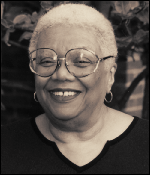 |
Lucille Clifton’s many books of poetry include Blessing the Boats: New and Selected Poems 1988-2000 (BOA Editions, 2000), which won the National Book Award; The Terrible Stories (1995), nominated for the National Book Award; and Good Woman: Poems and a Memoir 1969-1980 (1987), nominated for the Pulitzer Prize. Her honors include a Lannan Literary Award and two fellowships from the National Endowment for the Arts. She is a Chancellor of The Academy of American Poets. She has served as Poet Laureate for the State of Maryland and is currently Distinguished Professor of Humanities at St. Mary's College. |
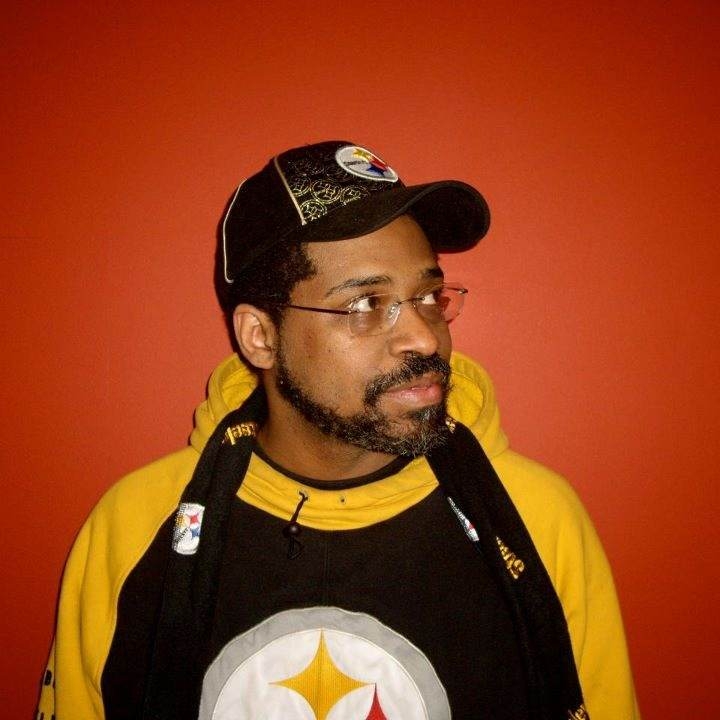 |
Joel Dias Porter (aka DJ Renegade) was the 1998 and 1999 National Haiku Slam Champion. His poems have been published in Time Magazine, The Washington Post, Callaloo, Antioch Review, and the anthologies Meow: Spoken Word from the Black Cat, Role Call, Def Poetry Jam, 360 Degrees of Black Poetry, Slam (The Book), Revival: Spoken Word from Lollapallooza, Poetry Nation, Beyond the Frontier, Catch a Fire, and The Black Rooster Social Inn, which he also edited. In 1995, he received the Furious Flower "Emerging Poet Award" from James Madison University. He has performed on the Today Show, in a commercial for Legal Jeans, in the documentaries Voices Against Violence and SlamNation, on BET's Teen Summit and By the Book, and in the feature film Slam. |
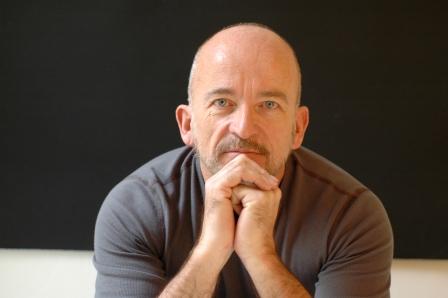 |
Mark Doty, the only American poet to have won Great Britain's T. S. Eliot Prize, is the author of six books of poems, including My Alexandria (1993), which received both the Los Angeles Times Book Prize and the National Book Critics Circle Award. He has also published Atlantis (1995), Sweet Machine (1998) and Source (2001), and School of the Arts (2005), as well as the memoirs Heaven's Coast (1996) and Firebird (1999). Among his many other awards are two NEA fellowships, Guggenheim and Rockefeller Foundation Fellowships, a Lila Wallace/Readers Digest Award, and the Witter Bynner Prize. Doty teaches in the graduate program the University of Houston, and is a frequent guest at Columbia University, Hunter College, and NYU. He lives in Houston and in New York City. |
 |
Martín Espada has published a dozen books in all as a poet, essayist, editor and translator. His eighth collection of poems, The Republic of Poetry, was published by Norton in October, 2006. His last book, Alabanza: New and Selected Poems, 1982-2002 (Norton, 2003), received the Paterson Award for Sustained Literary Achievement and was named an American Library Association Notable Book of the Year. An earlier collection, Imagine the Angels of Bread (Norton, 1996), won an American Book Award and was a finalist for the National Book Critics Circle Award. He has received numerous awards and fellowships, including a Guggenheim Fellowship, the Robert Creeley Award, the Antonia Pantoja Award, the PEN/Revson Fellowship and two NEA Fellowships. Espada is a professor in the Department of English at the University of Massachusetts-Amherst, where he teaches creative writing and the work of Pablo Neruda. |
 |
Known as a “poet of witness,” Carolyn Forché is the author of four books of poetry. Her first poetry collection, Gathering The Tribes (Yale University Press, 1976), won the Yale Series of Younger Poets Award from the Yale University Press. Her second book, The Country Between Us (Harper and Row, 1982), received the Poetry Society of America's Alice Fay di Castagnola Award, and was also the Lamont Selection of the Academy of American Poets. Forché’s anthology, Against Forgetting: Twentieth Century Poetry of Witness, was published by W.W. Norton & Co. in 1993, and in 1994, her third book of poetry, The Angel of History (HarperCollins, Publishers), was chosen for The Los Angeles Times Book Award. Forché has held three NEA fellowships, and a Lannan Foundation Literary Fellowship. Forché teaches at Skidmore College in Saratoga Springs. |
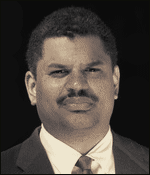 |
Brian Gilmore is a poet, writer, and public interest lawyer who currently teaches in the Clinical Law Program at the Howard University School of Law in Washington, D.C. He is the author of two collections of poetry, elvis presley is alive and well and living in harlem (Third World Press of Chicago, 1993) and Jungle Nights and Soda Fountain Rags: Poem for Duke Ellington (Karibu Books, 2000). Gilmore has been widely published in poetry anthologies and journals, and he is a regular columnist with the Progressive Media Project and a regular contributor to The Progressive Magazine. His poetry, essays, reviews, and other writings have appeared in The Washington Review, The Apple Valley Review, The Red Brick Review, The Washington Post, The Baltimore Sun, The Detroit Free Press, The Charlotte Observer, The Buffalo News, The Rochester Democrat, The Nation, The Utne Reader, Jazz Times, Jazz and Blues, American Songwriter Magazine, and many other national and local publications. Born and raised in Washington, D.C., and a graduate of Archbishop Carroll High School, he currently resides in Takoma Park, Maryland, with his family. |
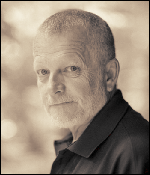 |
Sam Hamill is the author of fifteen volumes of original poetry, including Measured by Stone (Curbstone Press, 2007), and Almost Paradise: Selected Poems & Translations (Shambhala, 2005), and four volumes of essays including Avocations: On Poetry and Poets (Red Hen Press, 2007) and A Poet's Work (Carnegie-Mellon University Press). He has translated extensively from classical Chinese and Japanese and has been the recipient of many awards, including fellowships from the National Endowment for the Arts and the Guggenheim Foundation, the Stanley Lindberg Lifetime Achievement Award for Editing, and the Washington Poets Association Lifetime Achievement Award. He is Founding Editor of Copper Canyon Press and was Editor there from 1972 through 2004. In 2003 he founded Poets Against War, compiling the largest single-theme anthology in history, and editing a best-selling selection, Poets Against the War (Nation Books, 2003). |
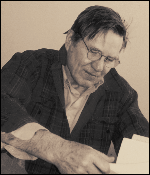 |
Galway Kinnell was born in Providence, Rhode Island, in 1927. His volumes of poetry include A New Selected Poems (Houghton Mifflin, 2000), a finalist for the National Book Award; Imperfect Thirst (1996); When One Has Lived a Long Time Alone (1990); Selected Poems (1980), for which he received both the Pulitzer Prize and the National Book Award; Mortal Acts, Mortal Words (1980); The Book of Nightmares (1971); Body Rags (1968); Flower Herding on Mount Monadnock (1964); and What a Kingdom It Was (1960). He has also published translations of works by Yves Bonnefroy, Yvanne Goll, and François Villon, and, this year, Rainer Maria Rilke. Kinnell divides his time between Vermont and New York City, where he is the Erich Maria Remarque Professor of Creative Writing at New York University. He is a Chancellor of The Academy of American Poets. |
 |
Stephen Kuusisto is the author of Only Bread, Only Light, a collection of poems from Copper Canyon Press, and of the memoirs Planet of the Blind and Eavesdropping. He holds a dual appointment at the University of Iowa in English where he teaches courses in creative nonfiction and serves as a public humanities scholar in the U of Iowa’s College of Medicine. He speaks widely on diversity, disability, education, and public policy. His essays and poems have appeared in numerous anthologies and literary magazines including Harper’s, The New York Times Magazine, Poetry, and Partisan Review. He is currently working on a collection of prose poems for Copper Canyon Press entitled Mornings With Borges as well as a collection of political poems about disability. |
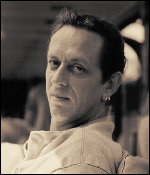 |
Semezdin Mehmedinovic was born in Tuzla, Bosnia in 1960 and is the author of four books, including Sarajevo Blues, composed of stories and poems written during the war in Bosnia-Herzegovina. Published in 1992 in Ljubljana, the book was the first in the Biblioteka egzilabc series, which provided a forum for Bosnian writers and translators under siege or living in exile. In 1993 he co-wrote and co-directed “Mizaldo,” one of the first Bosnian films shot during the war. The film won the first prize at the Mediterranean Festival in Rome the following year. He, his wife, and their child left Bosnia and came to the U.S. as political refugees in 1996. |
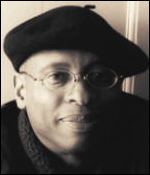 |
Ethelbert Miller is the author of several collections of poetry, most recently How We Sleep On The Nights We Don't Make Love (Curbstone Press, 2004). His memoir, Fathering Words: The Making of An African American Writer (St. Martin's Press, 2000), was featured in the DC WE READ program. He is the editor of several anthologies, including Beyond the Frontier: African American Poetry for the 21st Century (Black Classic Press, 2002) and In Search of Color Everywhere (Stewart, Tabori & Chang, 1995). His awards include the Columbia Merit Award and the O.B. Hardison Jr. Poetry Prize. Miller is director of the African American Resource Center at Howard University. |
 |
Naomi Shihab Nye is the author of numerous books of poems, including You & Yours (BOA Editions, 2005), 19 Varieties of Gazelle: Poems of the Middle East (2002), Fuel (1998), and Red Suitcase (1994). She has twice traveled to the Middle East and Asia for the United States Information Agency promoting international goodwill through the arts. Nye has received awards from the Texas Institute of Letters, the Carity Randall prize, and the International Poetry Forum. Her poems and short stories have appeared in various journals and reviews throughout North America, Europe, and the Middle and Far East. Nye has also written books for children, and has edited several anthologies of prose. |
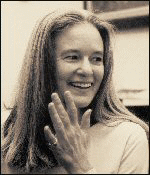 |
Sharon Olds is the Erich Maria Remarque professor and a permanent faculty member in the Creative Writing Program at New York University (NYU). Her first book of poetry, Satan Says, received the San Francisco Poetry Center Award. Her second book, The Dead and the Living, was both the Lamont Poetry Selection for 1983 and the winner of the National Book Critics Circle Award. She is also the author of The Gold Cell (1987), The Father (1992), The Wellspring (1996), Blood, Tin, Straw (1999) and The Unswept Room (2002). Her latest collection is Strike Sparks: Selected Poems, 1980-2002 (2004). She received a Lila Wallace-Readers’ Digest Grant in 1993, part of which was designated for the NYU workshop program at Goldwater Hospital on Roosevelt Island. In 1997, she received the Harriet Monroe Poetry Award. From 1998-2000 she was the New York State Poet Laureate. |
 |
Alix Olson is a performance poet and social activist. Her innumerable stage, broadcast, radio and print appearances include twice headlining HBO's “Def Poetry Jam” (Russell Simmons), and an inclusion in Utne Magazine's InRadio compilation. She has received a New York Foundation for the Arts fellowship and a Barbara Deming grant, as well as being voted 2004 OutMusician of the Year (OutMusic). She has headlined international poetry festivals in Portugal, the Netherlands, England, and Australia. She is the subject of “LEFT LANE - on the road with FOLK POET ALIX OLSON,” a film by Samantha Farinella. |
 |
Poet and Critic Alicia Suskin Ostriker's collection The Little Space: Poems Selected and New, 1968-1998 (University of Pittsburgh Press, 1998) was a finalist for the Lenore Marshall Poetry Prize. Her other books of poetry include The Crack in Everything (1996), a National Book Award finalist that won both the Paterson Poetry Award and the San Francisco State Poetry Center Award; and The Imaginary Lover (1986), winner of the William Carlos Williams Award of the Poetry Society of America. She has written several critical works, including Dancing at the Devil's Party: Essays on Poetry, Politics and the Erotic (2000), The Nakedness of the Fathers: Biblical Visions and Revisions (1994), and Stealing the Language: The Emergence of Women's Poetry in America (1986). |
 |
Ishle Yi Park is the Poet Laureate of Queens, New York. She has performed her unique blend of poetry & song across the United States, Cuba, New Zealand, Singapore, and Korea. Her first book, The Temperature of This Water, is the winner of three literary awards including the PEN America Beyond Margins Award for Outstanding Writers of Color. Her CD, Work is Love, includes tracks with Korean traditional drums, Spanish guitar, beatboxing, and music produced by Japan's critically acclaimed DJ Honda. Park has taught creative writing in high schools, colleges, prisons, and community centers across the country and has opened for artists such as KRS-One, Ben Harper, De La Soul, and Saul Williams. |
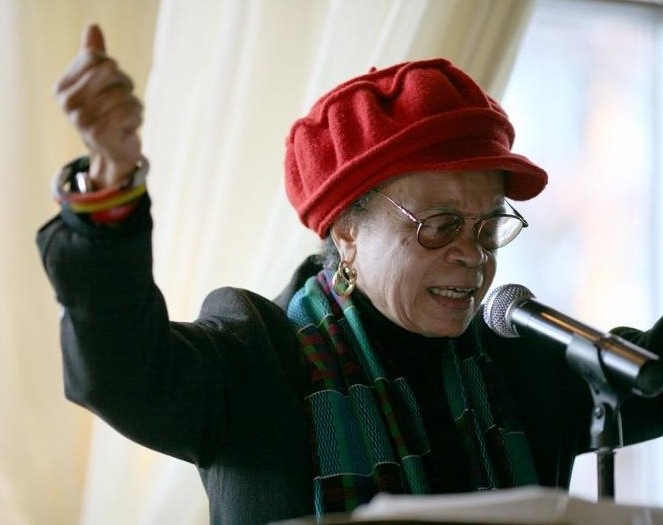 |
Sonia Sanchez is the author of more than a dozen books of poetry, including Homegirls and Handgrenades (White Pine Press, 2007), Shake Loose My Skin: New and Selected Poems (1999); Like the Singing Coming Off the Drums: Love Poems (1998); and Does your house have lions? (1995), which was nominated for both the NAACP Image and National Book Critics Circle Award. Among the many honors she has received are the Community Service Award from the National Black Caucus of State Legislators, the Lucretia Mott Award, the Outstanding Arts Award from the Pennsylvania Coalition of 100 Black Women, the Peace and Freedom Award from Women International League for Peace and Freedom (WILPF), a National Endowment for the Arts Award, and a Pew Fellowship in the Arts. She was the first Presidential Fellow at Temple University, where she began teaching in 1977, and held the Laura Carnell Chair in English there until her retirement in 1999. |
_218_bestBBAD.jpg) |
Patricia Smith, author, poet, teacher, performer, is the author of four books of poetry— Teahouse of the Almighty (Coffee House Press, 2006), a 2005 National Poetry Series selection, winner of the 2007 Paterson Poetry Prize and finalist for the 2007 Hurston/Wright Legacy Award; Close to Death (1993), Big Towns, Big Talk (1992), and Life According to Motown (1991). In addition, she has authored the history "Africans In America" and the children's book Janna and the Kings. Her next book, Blood Dazzler, a book of poems chronicling the tragedies of Hurricane Katrina, will be published in 2008 by Coffee House. Smith's work has appeared in Poetry, The Paris Review, TriQuarterly and many other journals. She is a Pushcart Prize winner, a Cave Canem faculty member, and a four-time individual champion of the National Poetry Slam, the most successful poet in the competition's history. |
.jpg) |
Jeffrey Thomson’s fourth collection of poems, Birdwatching in Wartime, is forthcoming from Carnegie Mellon University Press in 2009. Also forthcoming is Many Ways to Dig a Tunnel, a collection of translations from the Spanish of Cuban poet Juan Carlos Flores and From the Fishouse: An Anthology of Poems that Sing, Rhyme, Resound, Syncopate, Alliterate, and Just Plain Sound Great co-edited with Camille Dungy and Matt O’Donnell from Persea Books. An assistant professor of creative writing at the University of Maine Farmington, he has a recent chapbook, The Celestial Emporium of Benevolent Knowledge, from RopeWalk Press. |
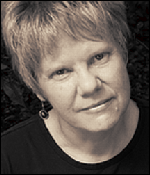 |
Susan Tichy is the author of Bone Pagoda, A Smell of Burning Starts the Day, and The Hands in Exile, a National Poetry Series volume. Her poems and mixed-genre works have appeared in the U.S. and Britain, and have been recognized by awards from the Eugene Kayden Foundation and the National Endowment for the Arts. She teaches in the Graduate Writing Program at George Mason University and also serves as Poetry Editor of Practice: New Writing + Art. When not teaching, she lives in a ghost town in the southern Colorado Rockies. |
 |
Of Russian/Czech/Siberian descent, Pamela Uschuk holds an M.F.A. from the University of Montana. She is the author of three books of poems, Finding Peaches in the Desert, One-Legged Dancer, and Scattered Risks. Her literary prizes include the Tucson/Pima Writing Award, the Struga International Poetry Prize, the Dorothy Daniels Writing Award from The National League of American PEN Women, IRIS Poetry Prize (University of Virginia) and the ASCENT Award (University of Illinois). Her work has been translated into Albanian, Spanish, French, Swedish, German and Czech. She is Director of the Salem College Center for Women Writers. |
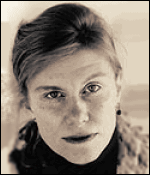 |
Belle Waring is the author of two poetry collections: Refuge (University of Pittsburgh Press, 1990), which won the Associated Writing Programs’ Award in 1989 and was cited by Publishers Weekly as one of the best books of 1990; and Dark Blonde (Sarabande Books, 1997), which won the Larry Levis Prize in 1998. She has worked as a neonatal nurse in Washington, DC’s hospitals. |
Schedule
| Thursday, March 20 | Friday, March 21 | Saturday, March 22 | Sunday, March 23 |
|---|---|---|---|
| 1:00 p.m. Press Conference | 8:30 a.m. Late registration | 8:30 a.m. Registration | 9:30-11 a.m. Panel: DC Poets Against the War |
| 2:00-6 p.m. Registration Begins | 10-11:00 a.m. Poetry Reading for Children | 9:00 a.m. Concurrent Poetry Walking Tours: The "Harlem" Renaissance in Washington, DC; Walt Whitman's DC; GLBT Literary History | Noon Featured Reading: Galway Kinnell, Sharon Olds |
| 5:00-7 p.m. Opening Celebration & Featured Reading by Sonia Sanchez, Busboys & Poets | 9-10:30 a.m. Panels & Workshops: Breaking Down Walls/Bridging Communities: Social Action Writing, Collaboration; Sustaining Ourselves: Creating Peer Writing Workshops That Work; Write from the Source: Breath, Gesture, Word; Yogic Path to Poetry and Conscious Action | 9-10:30 a.m. Panels & Workshops: Iraqi Children Speak: Story Telling, Poetry and Traditions Of Peace - Reading and Dialogue; Hero Anwar Brzw, Kakahama Askary, Christi Kramer, Iraqi (Kurdish) Children’s Writing Group; Yoga & Poetry: Tools for Trying Times; Once Spoken, No Longer Unspeakable | 1:00- 3 p.m. Silent March to White House for closing ceremony |
| 8:00 p.m. Featured Reading: Martín Espada, E. Ethelbert Miller, Naomi Shihab Nye, Alix Olson | 11-12:30 p.m. Panels & Workshops: Crip Poetry: A Culture of Disability, Justice and Art; Personal and Political: The Difficult Art of Writing a Manuscript of Poems that Bear Witness; Writing Down the Walls: Poetry in Prison; Off the Page and Into the Streets – Reports from the Field; Writing in a Warrior Culture | 11-12:30 p.m. Panels & Workshops: Writing Isn't Lonely: Collaborative Writing Workshop; Poet as Oracle; Poetry, Politics, and the Rant; The Poet as Political Appointee - an Oxymoron or Opportunity? | |
| 10:00 pm Opening Night After-Party | 1:30-3 p.m. Panels & Workshops: Outcry for Justice - The Lessons of Sacco and Vanzetti for the 21st Century; An IPS Discussion on Poetry and Policy; Bellessi, Ponge, and the Challenge to "Voice" in Poetry; The Healing Role of Poetry in Wartime |
1:30-3 p.m. Panels & Workshops: Word Warriors-Women Leaders in the Spoken Word Revolution; Writing Out (of) Crisis; Begin Again: A Tribute to Grace Paley, Sekou Sundiata, and Sandy Taylor; Vaulting History; Media Skills Training |
|
| 3:00-5 p.m. Downtime / informal meetups / unstructured time | 3-5 p.m. Teen Open Mic | ||
| 5:00 p.m. Featured Reading: Grace Cavalieri, Stephen Kuusisto, Joel Dias Porter (DJ Renegade), Ishle Yi Park, Winners of “The World & Me” Youth Poetry Contest | 5:00 p.m. Featured Reading: Coleman Barks, Lucille Clifton, Pamela Uschuk, Belle Waring | ||
| 8:00 p.m. Featured Reading: Jimmy Santiago Baca, Brian Gilmore, Semezhdin Mehmedinovic, Patricia Smith, Susan Tichy | 8:00 p.m. Featured Reading: Dennis Brutus, Kenneth Carroll, Mark Doty, Carolyn Forché, Alicia Ostriker, Jeffrey Thomson reads “Achilles in Jasper, Texas” | ||
| 10:00 p.m. Open Mic | 10:00 p.m. Split This Rock Film Program | ||
| 11:00 p.m. Open Mic |
Group Poem
On March 23, 2008, participants of the Split This Rock Poetry Festival walked silently from George Washington University to Lafayette Park in front of the White House. Once there, every participant stepped up to the mic and recited or read one 12-word line of poetry about peace that became the beautiful cento you see below.
I know you are reading this poem listening for something, torn between
bitterness and hope
Turning back once again to the task you cannot refuse.
Let’s dance! Let’s dance! Give peace a chance!
Bless them, with the forgiveness only the dead can afford to offer.
In an age without heroes I just want to be a man.
I think I could turn and go and live with the animals.
We draw from a deep well of sorrow and shame—my country and I.
The erosion of voice is the build-up of war …
I don’t know Baghdad
But I do know Albany
And it’s burning.
Oh wasteful war—we could have been learning and listening together!
Who needs oil? The sun ain’t going nowhere.
YA BASTA!
Lies win you nothing but folded flags in tear-drenched laps.
Alabanza …
I will teach you.
Music is all we have.
Make generals do the fighting.
A child’s hand will overturn their chessboard.
We must emerge from pioneer ashes to penetrate the bosoms of indifferences.
I work so hard to educate
I mourn as bombs annihilate.
Today poets animate the public podiums held by politicians manifesting once sleeping dreams.
“Stop the war” we say
But for this war our taxes pay.
Beneath Mordor —
Atlantis rising!
Inanna emerging from the Iraqi underworld, again.
Welcome!
Even when dreams vanish cranes glisten like snow in a broken field.
In my country there’s a censure called “freedom”
America, my heart opened for you.
Belief in the love of the world …
I.e., reality’s bonemarrow
resides in its pieces.
Weep, you may weep, but you may touch them not.
Singer-poet raised silent stumps
Music mangled but not voice
Viva Victor Jara!
We need one single person not to fight. Won’t you be that one?
I can no longer watch as you eat the shadows of others.
Carrying your harp of sighs you breathe out the music of mourning.
After the war’s funeral let us not suffer renovated marginalization ever again.
Connection with other
important as autonomy
Alone, not alone in the war zone.
We no longer whisper sweet nothings
War cries make poor pillow talk.
Words of peace pierce the wounded air here, like sweet bandages.
Where are you, Prince of Peace?
We could really use you now.
Placing words like quicksand, stepping forward where word bridges hold.
My bird-wing arm is wrapped around your heart’s spun glass cage.
War is not the answer. Talking it over is the answer.
A world of peace and social justice, protection of the planet.
Let us walk through
inviolable borders
like rain finding its
destined continent.
If you dare, come now with me,
Fearless, confident and free.
Turn your wrath on war when its winds rise. Spit and let the flags fight.
Love is what it is …
The calming stream that warms us …
The bombs pound holes in the night. Night after night.
This is our watch just for having been born.
they speak of the art of war
but arts
draw their light from the soul’s well
warfare
dries up the soul
Maybe you shook the hot bone dice.
Promise me not to go silent all of a sudden.
Hung one, young America died and continue to die
Terrorists occupy THE WHITE HOUSE
ahhh peace
ahhh end this war now
ahhh peace
bring them home
Our country
Our shock
Our awe
Our shame
Our recompense
Our future
Draw me a future I won’t be ashamed to leave my son.
Why, in America, are the only choices I’m allowed always between lesser evils?
What will you do, America, when the dormant poet begins to speak?
Carry the wounded world like a dying child in our arms forever, giving sorrow to words.
Melt down the vessel full that served as mixing pot of grief.
Can we bring down heaven, plant it here where they love?
The invasion of boots is everyday
Occupation is violence
Operation self-determination is salvation—spring.
You’ve ruined lives like centaurs tearing up trees with world-wasting cries …
“Both, I will have them both!” declared this true-blue American.
This fifth Easter Sunday drops yellow down my throat—what must I do?
Mercy, Mercy
“America can’t leave ‘em go like this.”
Under the peace hungry eyes of the world,
Cherry blossoms witness the fifth anniversary of the Iraqi war.
Politics of death and taxes bring me here to grieve.
Blood on Blood—red matter fragments! What follows? Let it be—luminous, free!
A painter says red, white + blue. No more purple hearts for you.
So instead of war, we might have had much improvisational festivity.
Dichoso el árbol que es apenas sensitive
Y más la piedra dura …
This empirical wonderland is spinning off its evil axis
and I am pissed off.
Listen—the murmur
of 100 million stars
too distant to fear
any fighting.
Baghdad, once called the given garden—
a desert—stolen—water, medicine, citizen.
Easter, again, and the sky as blue as the oldest promise.
Blackwater, Boeing, CACI, Dyncorp, GE, General Dynamics, Halliburton, KBR, Lockheed, Raytheon, SAIC?
When your venomous cabal is gone, may the earth truly blossom again.
Weight-bearing has made us strong
Our bones metal
Muscles sinew hearts anealled
Can’t we try to win this peace? Because we’re never gonna win this war.
Weapons of mass construction—loving-kindness, diversity, joy!
War, you’re in our cross-hairs.
O voice of all-night wind and rain,
do you count the petals that are falling?
There is more beauty in words than in war.
The most deafening weapons in any war should be lyrics, not landmines.
Carry our well wherever we walk, saturating scars with living waters, promise.
O sister of nausea of broken ribs of isolation
what is the freedom I protect how is it mine
Mothers search the skies for their sons and daughters.
I dream of a child who will ask, “Mother, what was war?”
Move within. But don’t move the way fear makes you move.
Melt, melt away ye armies—disperse ye blue-clad soldiers,
Resolve ye back again, give up for good your deadly arms.
May rooms of dryness find you fed … watched by every human love.
The light is always there, even on an empty page or in my dream.
Where there is no wisdom, the people perish.
I am grafted to the skin of this land and its blood
“Islands”: For God’s sakes
Don’t you know
they are connected
underneath?
Look up—veil of cherry blossoms—peace rising.
Happy peacemakers know—even in sorrow, anger—we’re all children—one love.
1968: screaming screaming STOP this war;
2008: silent, silent STOP this war.
On a day of unreportable sadnesses we must reteach a thing its loveliness.
Go ahead open your hand ...
The lone night bird sings to the tortured between screams.
If I keep from imposing on people, they become themselves.
Peace is within reach, over the horizon just beyond war.
The best lack all conviction while the worst
are full of passionate intensity.
Where the princes are principled and the poets empowered, there is the land where peace is possible!
Let there be peace on Earth, the peace that was and is meant to be.
Let there be peace on Earth and let it begin with me.
And the narrowest hinge of my hand parts to score all machinery.
The children are waiting to be heard, listen to their silenced cries.
We inherit ashes and transform these into the rich compost of poetic possibility.
Let America be America again.
All thinking people oppose terrorism both domestic and international …
The winding Potomac lazily drifts by the Pentagon, journeying towards the sea.
America, let the words of the poets ring in your head.
No sick winter shall blot out the stars of our defiance.
Heroes want hugs, but send bombs to buildings to excuse their absences.
We are borne with dreams in our hearts, looking for better days ahead.
I’ve never been to war, except inside.
Please stop war. We want peace and we will not fight.
Poetry made me brave. It tells me we can build our peace.
Enough, I say, enough.
5 years. How long until even the gods are ashamed.
Happiness exists, I can feel it.
Why are we here,
Because the heart needs to burn bigger than fear.
Mr. Bush, you’ve pushed war 5 Easters. Ask this: who would Jesus torture?
Dung beetle says, “I want dung, not blood.”
You have broken our laws, and our hearts, but not our spirit.
Lilacs are still ten dreams away.
… old fathers … consider the necessary eradication of the new fathering fathers (who are their sons) …
To be free why do we steal the dignity of others?
War is like cancer: It’s treated, but needs a cure.
All those ships that never sailed.
Hate never dispels hate
only love
each the other
one heart
And because everything we carry is really ours.
T’ai chi afternoon
What about sweet surrender?
Sink and relax.
Lieutenant! This corpse will not stop burning!
The world begins at a kitchen table. No matter what, we must eat to live.
Look around
The intifada is coming
and we are the stones.
We will NOT be SILENT.
Yes, we do want to be well.
I dream a world where love will bless the earth.
We are warriors of the light
shine, shine, shine
love love love.
Angels in bright raiment rolled the stone away.
The underthrum, the handing off from one voice to another.
Don’t you hear this hammer ring?
We are the sworn poets of every dauntless rebel the world over!
Partners
Supporters
Janet Aalefs, Frances Payne Adler, Malaika Albrecht, Lauren Alleyne, Francisco Aragon, Ann Arbor & John Rosenwald, Barbara Schaffer Bacon, Coleman Barks, Blue Mountain Center, Harriet Barlow, Director, Elliott, Femynye batTzedek, Naomi Benaron, Jen Benka, Rose M. Berger, Rei Berroa, Eric Borlaug, Henry Braun, Susan Brennan, Andrea Carter Brown, Vera Leone Brown, Ann Hutt Browning and Preston Browning, Jr., Katherine Browning and Richard Buchsbaum, Sarah Browning and Tom Hertz, Reginald Cabico, Heather Davis and Jose Padua, Jeffrey Davis, Sheree Fitch, Yael Flusberg, Susan Gibbs, Robert Giron/ Gival Press, Coucil Member Jim Graham, Joanne Growny, Daniel Hall, Lauren Harrison, Louise and Neil Hertz, Jaime L. Jarvis, Melody M Kawamoto, Lynda Koolish, Linda and Richard Larochelle, Dan Logan, Adrian Lurssen, Elizabeth Macklin, Sarah Massey, Peter Montgomery and Dan Vera, Mary Morris, David Neigus and Mieke Meurs, Tom Mullins and Christie Walser, Akenji Ndumu, Michael Newheart, Kathleen R. O’Toole, Mark W. Ohnmacht, Tema Okun, Alicia Ostriker, William Palmer, Richard M. Peabody, Jr., Patric Pepper and Mary Ann Larkin, Neida Perez, Senator Jamie Raskin, Lynn & Marcus Raskin, Adrienne Rich, Martha Richards, Kathryn E Richey and Alice A Richey, Danny Rose, Laurent Ross, Gwen Rubinstein, Elizabeth Schulman And David Kamens, Nancy Seifer & Martin Viewig, Andy Shallal, Yasir & Amal Shallal, Lee Sharkey, Julie Sheehan, Lynn Shoemaker, Myra W. Sklarew, Katherine Smith, Lauren Smythe, Melissa Tuckey & David Phillips, Joe Ross & Robert Waxman, Arlene Weiner, Robin Weiss-Castro, Anita Wheeler, White Crane Institute, Inc., Rosemary Winslow, Miriam Zanders, Ed Zeizel
Split This Rock is funded in part by:
The Blue Mountain Center, Harriet Barlow, Director
The Canterbury Foundation
CDQ Charitable Trust
City Bridge Foundation
Crosscurrents Foundation
The D.C. Commission on the Arts and Humanities, an agency supported in part by the National Endowment for the Arts
Lucius & Eva Eastman Fund
The Ford Foundation
The Humanities Council of Washington
Poets & Writers, Inc.
White Crane Institute, Inc.
Special Thanks as well to these organizations and businesses for their support of Split This Rock:
The Blue Mountain Center, Harriet Barlow, Director
The Canterbury Foundation
CDQ Charitable Trust
City Bridge Foundation
Crosscurrents Foundation
The D.C. Commission on the Arts and Humanities, an agency supported in part by the National Endowment for the Arts
Lucius & Eva Eastman Fund
The Ford Foundation
The Humanities Council of Washington
Poets & Writers, Inc.
White Crane Institute, Inc.